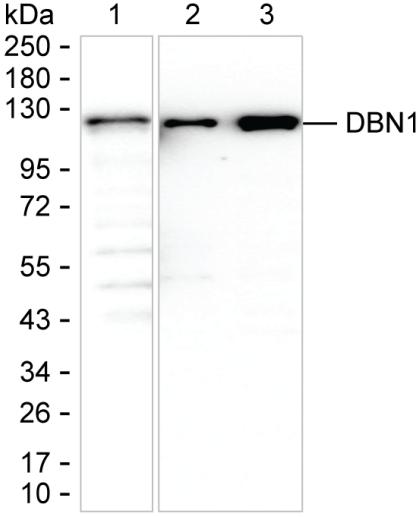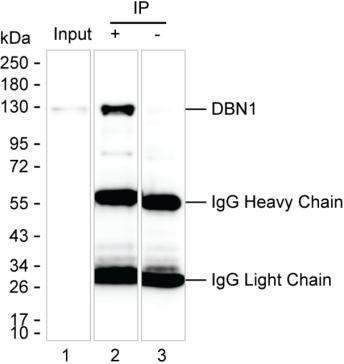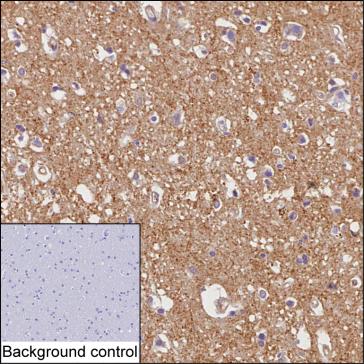


| WB | 咨询技术 | Human, Rat, Mouse |
| IF | 1/100-1/200 | Human, Rat, Mouse |
| IHC | 1/100-1/200 | Human, Rat, Mouse |
| ICC | 技术咨询 | Human, Rat, Mouse |
| FCM | 咨询技术 | Human, Rat, Mouse |
| Elisa | 咨询技术 | Human, Rat, Mouse |
| Host/Isotype | Mouse IgG1 |
| Antibody Type | Primary antibody |
| Storage | Store at 4°C short term. Aliquot and store at -20°C long term. Avoid freeze/thaw cycles. |
| Species Reactivity | Human, Rat, Mouse |
| Immunogen | Purified recombinant fragment of human DBN1 |
| Formulation | Purified antibody in PBS with 0.05% sodium azide |
+ +
以下是关于DBN1(Drebrin-like protein)抗体的参考文献示例(注:文献信息为示例性概括,实际引用需核实):
---
1. **文献名称**: *Drebrin regulates neuroblast migration and cortical neuron morphology*
**作者**: Mizui T. et al.
**摘要**: 研究利用DBN1抗体进行免疫组织化学分析,发现Drebrin在发育中的大脑皮层神经元迁移中起关键作用,并影响树突棘的形态发生。
2. **文献名称**: *DBN1 as a biomarker for invasive cancer cells*
**作者**: Lin Y. et al.
**摘要**: 通过DBN1抗体检测发现,Drebrin在多种癌细胞的侵袭前沿高表达,提示其可能通过调控细胞骨架促进肿瘤转移。
3. **文献名称**: *Interaction of Drebrin with actin cytoskeleton in synaptic plasticity*
**作者**: Shirao T. et al.
**摘要**: 使用DBN1抗体的实验表明,Drebrin通过稳定F-actin网络参与突触可塑性,影响学习和记忆的分子机制。
4. **文献名称**: *DBN1 knockdown disrupts neuronal polarity in vitro*
**作者**: Gao J. et al.
**摘要**: 利用DBN1抗体验证基因沉默效果,发现Drebrin缺失导致神经元极性丧失,突触蛋白运输受阻。
---
建议通过PubMed或Google Scholar检索具体文献,输入关键词“DBN1 antibody”或“Drebrin antibody”获取真实研究。
DBN1 (Drebrin-like protein) is a cytoskeletal-associated protein that plays a critical role in regulating actin dynamics, particularly in neuronal and cancer cells. It shares structural homology with drebrin, a protein essential for synaptic plasticity, and is involved in processes such as cell migration, adhesion, and morphogenesis. DBN1 is highly expressed in the brain, where it contributes to dendritic spine formation and neuronal network organization. In cancer biology, DBN1 is implicated in tumor metastasis by promoting invadopodia formation, facilitating extracellular matrix degradation, and enhancing invasive cell behavior. Its overexpression has been linked to poor prognosis in cancers like glioblastoma and hepatocellular carcinoma.
DBN1 antibodies are essential tools for studying these biological processes. They enable the detection and localization of DBN1 in tissues and cultured cells through techniques like Western blotting, immunofluorescence, and immunohistochemistry. Researchers also use these antibodies to investigate DBN1's functional roles via knock-down/knock-out experiments or inhibition studies. Commercially available DBN1 antibodies are typically raised against specific epitopes, such as the N-terminal or coiled-coil domains, and require validation for species cross-reactivity (human, mouse, rat) and application-specific suitability. Recent studies employing DBN1 antibodies have advanced understanding of neurodevelopmental disorders and cancer mechanisms, highlighting its dual role in neural homeostasis and pathological cell invasion.
×